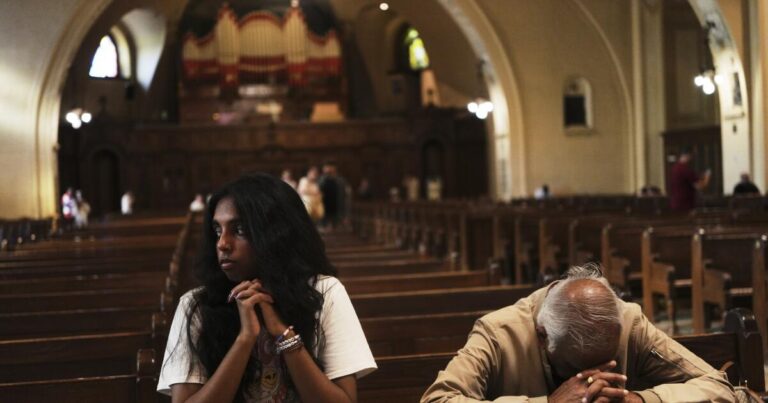MONTREAL — Throughout his new term, starting with his inaugural address, President Trump has said he was “saved by God” to make America great again. In Canada, Prime Minister Mark Carney rarely evokes religion in public; his victory speech in April never used the word God. “Canada forever. Vive le Canada,” he ended.
As Canada and the U.S. now skirmish over Trump’s tariff threats and occasional bullying, the leaders’ rhetoric reflects a striking difference between their nations. Religion plays a far more subdued role in the public sphere in Canada than in its southern neighbor.
Trump posed in front of a vandalized Episcopal parish house gripping a Bible. He invites pastors to the Oval Office to pray with him. His ally, House Speaker Mike Johnson, says the best way to understand his own world view is to read the Bible.
Such high-level religion-themed displays would be unlikely and almost certainly unpopular in Canada, where Carney — like his recent predecessors — generally avoids public discussion of his faith. (He is a Catholic who supports abortion rights.)
There are broader differences as well. The rate of regular church attendance in Canada is far lower than in the U.S. Evangelical Christians have nowhere near the political clout in Canada that they have south of the border. There is no major campaign in Canada to post the Ten Commandments in public schools or to enact sweeping abortion bans.
Kevin Kee, a professor and former dean at the University of Ottawa, has written about the contrasting religious landscapes of the U.S. and Canada, exploring the rise of American evangelist Billy Graham to become a confidant of numerous U.S. presidents.
Christianity, Kee said, has not permeated modern Canadian politics to that extent.
“We have a political leadership that keeps its religion quiet,” Kee said. “To make that kind of declaration in Canada is to create an us/them situation. There’s no easy way to keep everybody happy, so people keep it quiet.”
A dramatic loss of Catholic power in Quebec
The mostly French-speaking province of Quebec provides a distinctive example of Canada’s tilt toward secularism. The Catholic Church was Quebec’s dominant force through most of its history, with sweeping influence over schools, health care and politics.
That changed dramatically in the so-called Quiet Revolution of the 1960s, when the provincial government took control of education and health care as part of a broader campaign to reduce the church’s power. The rate of regular church attendance among Quebec’s Catholics plummeted from one of the highest in Canada to the one of the lowest.
Among religiously devout Canadians, in Quebec and other provinces, some are candid about feeling marginalized in a largely secular country.
“I feel isolated because our traditional Christian views are seen as old-fashioned or not moving with the times,” said Mégane Arès-Dubé, 22, after she and her husband attended a service at a conservative…
Read More: Trump’s religious rhetoric clashes with Canada’s secular politics



